This week, the media in the region covered several substantial investment and infrastructure stories, including the Chinese company East Hope Group investing $12 billion in a new metallurgical complex in Kazakhstan, Uzbekistan securing critical funds for its green transition from the ADB and IsDB, and an American consortium winning the contract to construct the $3 billion Makmal-Karakol railway. The media also reported on several diplomatic events, including President Mirziyoyev’s visit to Kuwait, President Tokayev’s visit to Jordan, and Kyrgyzstan and Tajikistan's signing of a historic border agreement. Multiple sources also focused on the drone attack on the CPC pipeline, which transports most of Kazakhstan’s oil exports. Nevertheless, it appears that there has been little disruption to its operation. Lastly, several outlets also focused on the impact of U.S. aid cuts in the region, with countries such as Afghanistan likely to face significant difficulties.
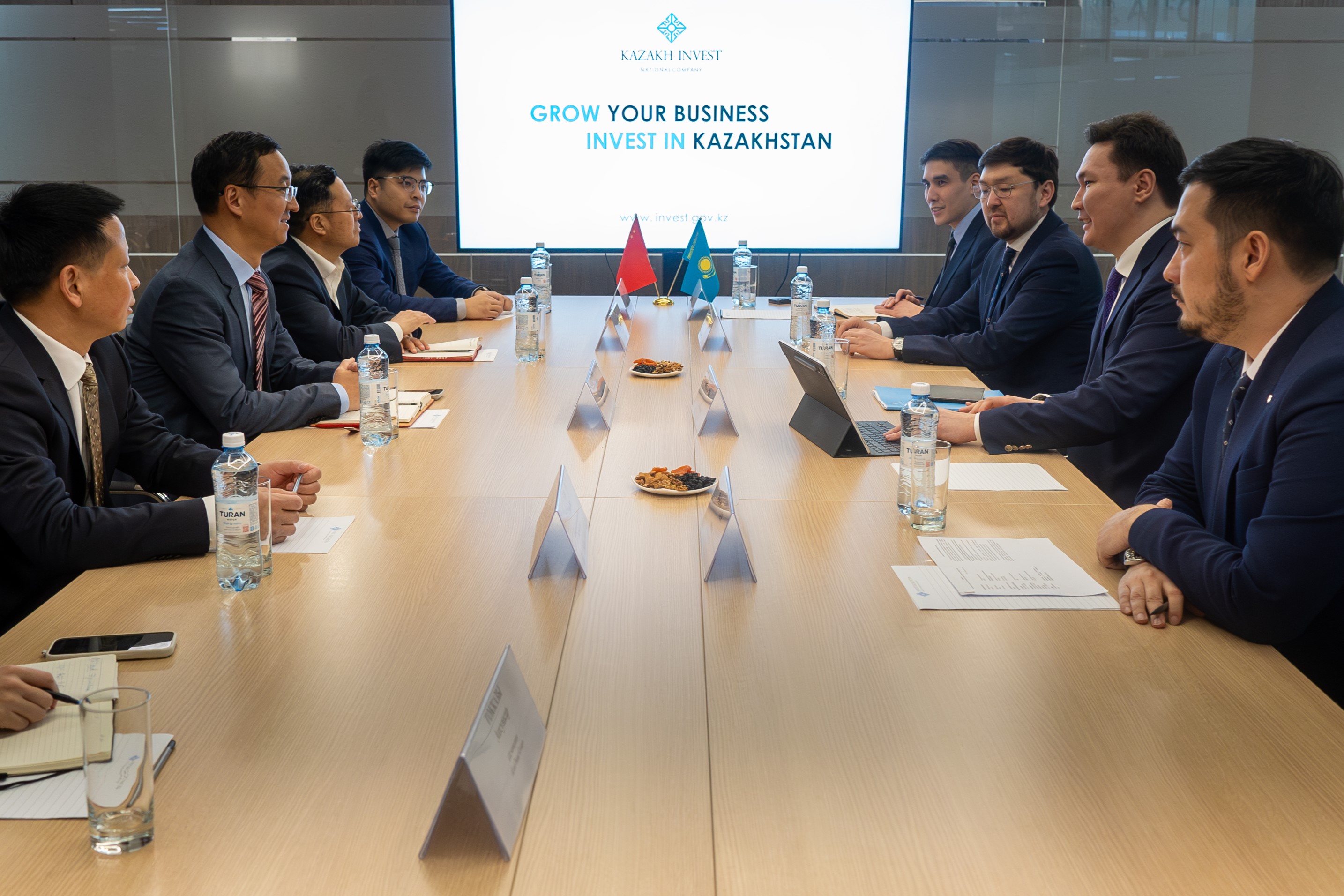
Chinese company East Hope Group plans to construct a $12 billion non-ferrous metal production plant in Kazakhstan. Source: Kazakh Invest
Investment
Kazakhstan has signed an agreement with the Chinese company East Hope Group to establish one of the country’s largest metallurgical production facilities (The Astana Times). East Hope Group is a leading global non-ferrous metals and semiconductor technology producer. The company expects to invest $12 billion into constructing new production facilities across two regions, including an industrial park, a mining and processing plant, an electrolysis plant, and a power plant. Kazakh Deputy Foreign Minister Alibek Kuantyrov, Vice Minister of Industry and Construction Olzhas Saparbekov, and General Director Changjun Meng signed the agreement at a meeting on February 18. The project will create nearly 10000 new jobs and concentrate on producing for the export market.
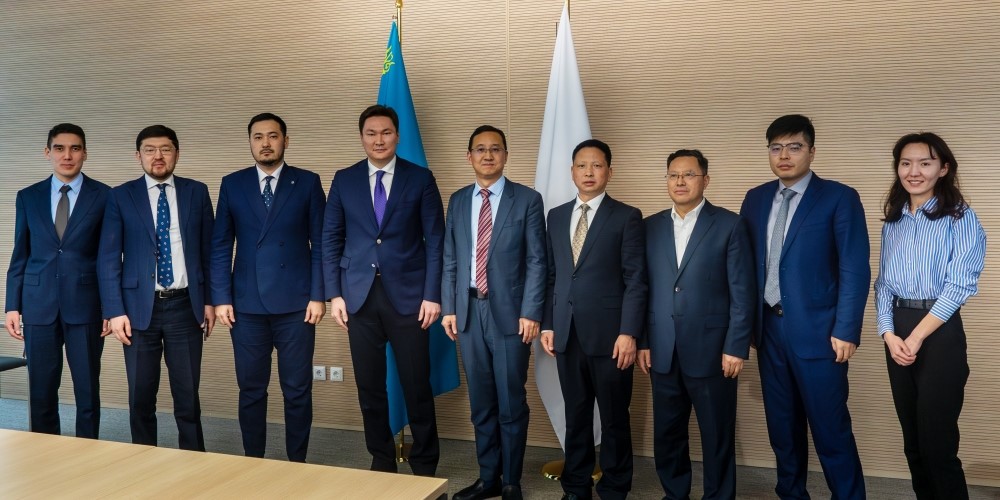
Chinese company East Hope Group plans to construct a $12 billion non-ferrous metal production plant in Kazakhstan. Source: Kazakh Invest
Uzbekistan concluded two investment agreements valued at $299 million with the Islamic Development Bank (IsDB) (The Times of Central Asia). The agreements were signed at the Al-Ula Conference for Emerging Market Economies by IsDB Chairman Dr. Muhammad Al Jasser and Uzbekistan’s Deputy Prime Minister Jamshid Kuchkarov. Under the first agreement, the IsDB pledged $160.25 million towards improving Uzbekistan’s education system. The program, in collaboration with the Global Partnership for Education, will fund the construction of 58 modern schools and several teacher training initiatives. The other agreement, worth $138.8 million, will enable the upgrading of a section of the A373 highway that runs between Tashkent and Osh. The upgrades will expand the highway to four lanes and reduce journey times by half and accidents by 40%. Last year, the IsDB announced a similar investment of $260 million in Uzbekistan’s infrastructure from 2024 to 2028.
The Asian Development Bank (ADB) will provide Uzbekistan with a $125 million loan to improve its water management systems (The Tashkent Times). The Climate-Resilient Smart Water Management Project will improve the management of the country’s limited water resources while enhancing the institutional capacity of its water utility, Uzsuvtaminot. For instance, it will fund the installation of water meters and telemetry systems at water facilities. The project will also conduct an inventory of all assets and map all existing water and sanitation infrastructure. It will also introduce several new digital solutions, such as IT-based climate-smart utility management systems and new financial management systems. Overall, the project aims to improve efficiency and reduce operating costs. Uzbekistan has also received a $250 million loan from the European Bank of Reconstruction and Development (EBRD) to renovate its irrigation infrastructure as part of the second phase of its water supply-energy efficiency project. In the first phase, 118 pumping stations were modernised in the Fergana region. The second phase, with a total cost of $287.1 million, will renovate another 110 pumping stations. Overall, the project aims to enhance climate change mitigation, ensuring a sustainable water supply for agriculture.
Kyrgyzstan’s national railway company, Temir Zholu, and the American consortium, All American Rail Group Global Infrastructure Partner, have signed an agreement worth $3 billion to construct the Makmal-Karakol railway (24.kg). The railway will dramatically improve connectivity within Kyrgyzstan and with neighboring countries, boosting economic growth. American Rail Group Global Infrastructure Partner is an international consortium that brings together leading companies in the design, construction, and management of large rail projects. The consortium has overseen 3000 railway projects and has seen a turnover of $19.7 billion in the last five years.
Aid
According to a Centre for Global Development report, Afghanistan’s economy will contract 7% this year due to reduced U.S. aid (Daryo). Previously, USAID provided more than 20% of the international assistance received by Afghanistan, amounting to $3 billion over the past three years. Many anticipate the aid cuts will severely impact humanitarian efforts, which have already led to the shutdown of numerous U.N. programs. Despite the Biden administration's pledge of $234 million to Afghanistan in 2025, President Trump has not allocated any funds since he assumed office.
Energy
Kazatomprom has contracted with Axpo Power and Kernkraftwerk Leibstadt to supply Swiss nuclear power plants (NPP) with uranium materials (Kazinform). The contract stipulates that Kazatomprom will provide uranium concentrates to Switzerland’s Beznau and Leibstadt NPPs. The signing ceremony took place at Axpo Power’s headquarters in Switzerland. In 2024, Kazatomprom produced 23270 tons of uranium oxide, a 10% increase compared to 2023 (Kursiv). Nevertheless, the company’s sales dropped from 18,069 tons to 16,670 tons. However, the price for a pound of uranium oxide rose by 27% in 2024, from $69.72 to $55.09. This year, the company expects to produce between 25000 and 26500 tons, an increase of between 7.4% and 13.9% over 2024. Currently, Kazatomprom supplies 20% of the world’s uranium. This deal will help it to maintain its position as one of the world’s leading producers.
During a meeting on February 19, President Shavkat Mirziyoyev reviewed efforts to improve energy efficiency in Uzbekistan (Daryo). Last year, Uzbekistan produced 50 billion cubic meters of natural gas and 81 billion kilowatt-hours of electricity. Nevertheless, with consumption anticipated to rise 1.7 times by 2035, the government continues to prioritize increasing production and efficiency improvements. Studies have indicated that Uzbekistan requires 2.5 times more energy than the global average to produce $1 of GDP. At the same time, the electricity network lost 14%, and gas lost 7%. In an effort to reduce waste, experts have identified numerous possible initiatives that could save 4.6 billion kilowatt-hours of electricity and 1 billion cubic metres of gas. These include modernising water pumping stations, which could save 1 billion kilowatt-hours. They also recommended upgrading boilers in state institutions and expanding the use of renewables, saving 5 million cubic metres and 15 million kilowatt-hours of electricity. Furthermore, they advocated encouraging the implementation of energy-saving measures across private industry by introducing new energy consumption standards, which could save 1.6 billion cubic meters of gas and 3.5 billion kilowatt-hours of electricity. New buildings will also receive better insulation, and low-interest loans will be provided to encourage the installation of solar panels.
Despite damage from a Ukrainian drone attack earlier this week, on February 20, Kazakhstan announced it transported record volumes along the Caspian Pipeline (CPC) (Reuters). Earlier, the Russian side stated that the attack reduced CPC capacity by 30-40%. On February 19, Kazakhstan’s oil and gas condensate production reached 2.12 million barrels per day. Oil output alone surged to 920000 barrels per day compared to 900000 in early February and 640000 in January. However, given the limits of existing pipeline capacity, it is not immediately clear how they managed to increase exports. On February 18, Kazakhstan’s Energy Ministry said it was exporting oil as usual. The CPC carries around 80% of Kazakhstan’s oil exports from its expansive Tengiz oil field along the northeastern shore of the Caspian to the Russian port of Novorossiysk on the Black Sea. The record high output at the Tengiz field follows a recent $48 billion expansion.
In an interview with Kazinform, the chairman of the KazMunayGaz’s board, Askhat Khasenov, stated the national oil company would be interested in increasing its stake in the Tengiz oil field (Kazinform). Currently, KazMunayGaz controls a 20% stake in the Tengiz oil field operator, Tengizchevroil. Other shareholders include Chevron (50%), ExxonMobil Kazakhstan (25%), and Lukoil (5%). Earlier, we reported that President Tokayev instructed his government to seek better terms from international energy companies operating in the country. In recent years, the Kazakhstani government has also fined several energy companies, including Chevron. Chevron and others have accused the Kazakhstani government of “resource nationalism” in response.
This week, it was reported that Russia intends to export gas to Kazakhstan through a new trunk pipeline (Kursiv). The trunk pipeline will pass through the Tyumen region and supply 10 billion cubic metres of gas to northern Kazakhstan. In December 2024, Russian Deputy Prime Minister Alexander Novak announced that construction of a new gas pipeline from Russia through Kazakhstan to China had begun. The pipeline will have a capacity of 45 billion cubic metres, with 35 billion designated for export to China and the remaining 10 billion for Kazakhstan.
Diplomatic Events
Uzbekistani President Shavkat Mirziyoyev visited Kuwait from February 17 to 18 (UZ Daily). President Mirziyoyev met with the Emir of Kuwait, Sheikh Mishal al-Sabah, and discussed strengthening relations between their countries. They noted the increase in political contacts, including the first meeting of the intergovernmental commission last November. They elaborated on their countries’ cooperation in the green energy, agricultural, industrial, transport, healthcare, and tourism sectors. To promote and develop joint projects, they agreed to establish an Investment Platform and a Business Council. Besides the joint statement on developing the comprehensive partnership between Uzbekistan and Kuwait, both leaders also signed a plethora of other agreements concerning air transport, labour, smart city development, art and culture, tourism, and healthcare. Most significantly, they concluded a deal with the Kuwait Fund for Arab Economic Development. The leaders explored holding cross-cultural and tourism weeks in their respective countries. Between 2017 and 2024, bilateral trade between Uzbekistan and Kuwait increased from $289,000 to $6.8 million. Meanwhile, the total amount of foreign direct investment received by Uzbekistan from Kuwait amounted to $12.6 million over the same period. This week, Abdulla Azizov, Director of the Agency for the Development of the Pharmaceutical Industry of Uzbekistan, announced that Uzbekistan has started negotiations with three major Kuwaiti pharmaceutical companies (Kun). Al Imtiaz Investment Group is looking to set up contract-based pharmaceutical production in Uzbekistan. Meanwhile, Gulf Care has pledged to invest $260 million in establishing diagnostics centres, production facilities, laboratories, and training programs. Lastly, Kuwait Saudi Pharmaceutical Industries has also shown interest in collaborating with Uzbekistan.
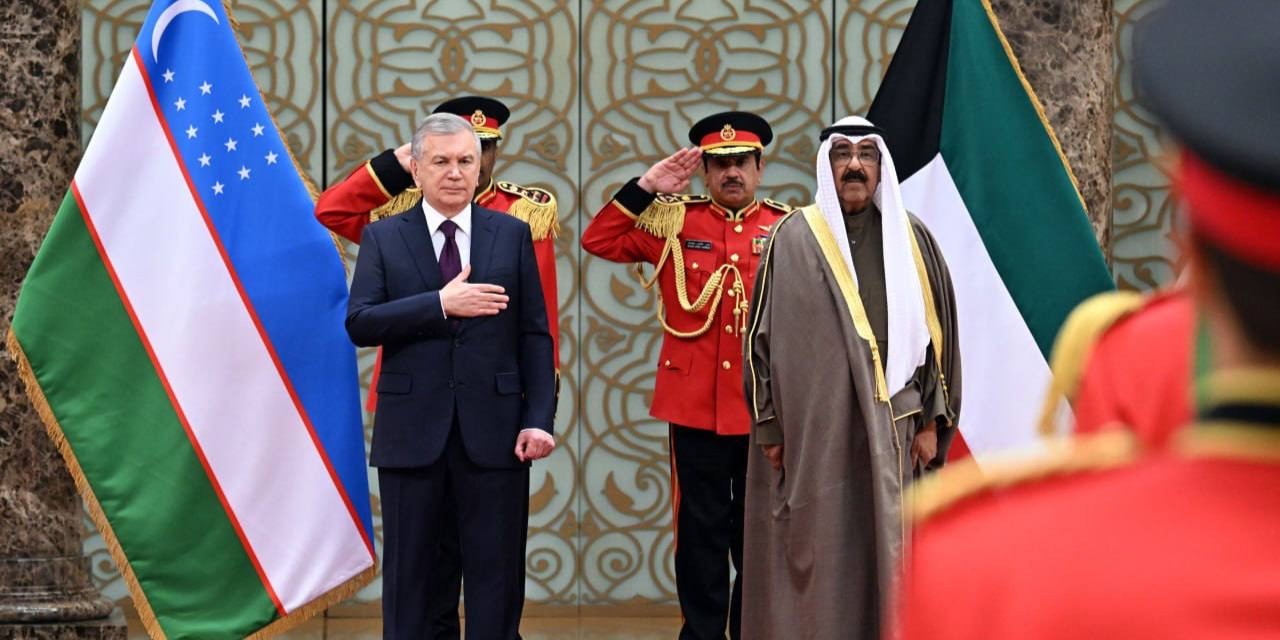
Uzbekistani President Shavkat Mirziyoyev visited Kuwait. Source: Daryo
On February 17, Hungarian Foreign Minister Péter Szijjártó met his Kazakhstani counterpart, Murat Nurtleu, for talks in Astana (The Astana Times). Both Foreign Ministers discussed their commitment to deepening their countries’ strategic partnership. They elaborated on areas of political, economic, and energy cooperation. They also reviewed the implementations of agreements concluded during President Tokayev’s visit to Budapest in November 2024 and Prime Minister Orban’s visit to Astana in November 2023. In 2024, trade between Hungary and Kazakhstan grew by 4.4% to $200 million, and both ministers explored ways to increase trade turnover to over $1 billion. Overall, Hungary has invested $370 million in 16 projects across Kazakhstan, including the Hungarian oil and gas company MOL’s $200 million investment in Kazakhstan’s Rozhkovskoye gas condensate field. To increase trade turnover, officials discussed opening Hungarian banks in Kazakhstan, constructing a cargo terminal in Budapest, and boosting Kazakhstani oil, uranium, and critical mineral exports to Hungary. Foreign Minister Péter Szijjártó also met with Kazakhstan’s Energy Minister Almassadam Satkaliyev during his visit (Orda.kz). They agreed that Kazakhstan would conduct its first test deliveries of oil through the Druzhba pipeline to Hungary in 2025. They also examined cooperation in the nuclear sector, with Satkaliyev expressing interest in various Hungarian nuclear power plant technologies, such as the dry cooling towers manufactured by the MVM Group.
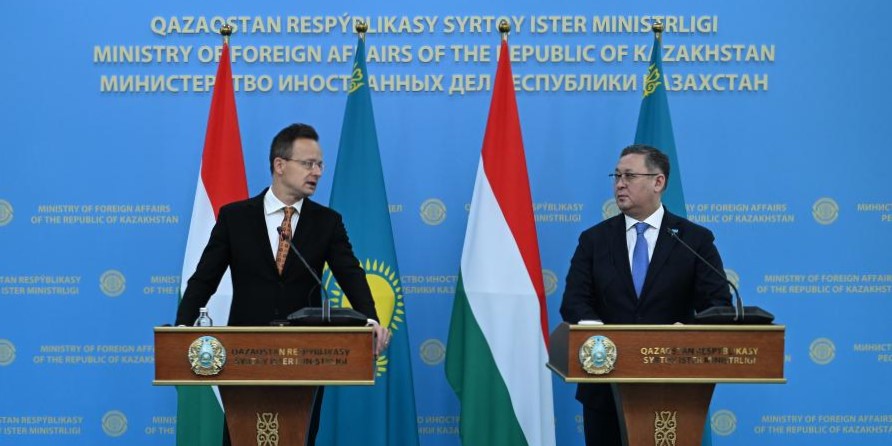
Hungarian Foreign Minister, Péter Szijjártó, visited Astana this week to strengthening their countries’ strategic partnership. Source: Gov.Kz
On February 19, Kazakhstani President Kassym-Jomart Tokayev arrived in Jordan on an official visit (The Astana Times). He met with King Abdullah II bin Al Hussein and Crown Prince Al Hussein during his visit. They discussed cooperation across various sectors, including agriculture, transport, investment, trade, and energy, among others. After their talks, the two leaders signed a joint statement. Both countries concluded several MoUs concerning industrial cooperation, nuclear energy, media interactions, cooperation between the Kazakh Ministry of National Economy and the Jordanian Ministry of Industry and Trade and Supply, and a cooperation agreement between Samruk Kazyna and the Jordanian Ministry of Investment. Government and business representatives from both countries also signed ten interdepartmental and commercial agreements. On the sidelines of the visit, Kazatomprom signed an MoU with the Jordan Uranium Mining Company (JUMCO) (Kursiv). According to the MoU, both companies agreed to collaborate in geological exploration and mining across various sites in Jordan. The Jordanian government established JUMCO in 2013 to develop the country’s abundant uranium resources.
Tajikistan and Kyrgyzstan have signed a historic agreement demarcating their 972-kilometer border (Daryo). The comprehensive deal includes a treaty delimiting the state border, an agreement on managing energy and water resources, and a plan to upgrade cross-border roads and crossings. The national security chiefs of both countries, Kamchybek Tashiev and Saimumin Yatimov, led the negotiations in recent years and signed the agreement at a ceremony in Bishkek. Kyrgyzstani President Sadyr Japarov noted the fairness of the agreement. He acknowledged that some areas were split equally, while other settlements would have to relocate. He confirmed that citizens of either country who found themselves on the wrong side of the new border would be resettled. Talks to delimit the international border have been ongoing since 2002. However, they accelerated in 2022, after violent clashes in April-May 2021 and September 2022 resulted in the deaths of around 200 people and the displacement of thousands more.
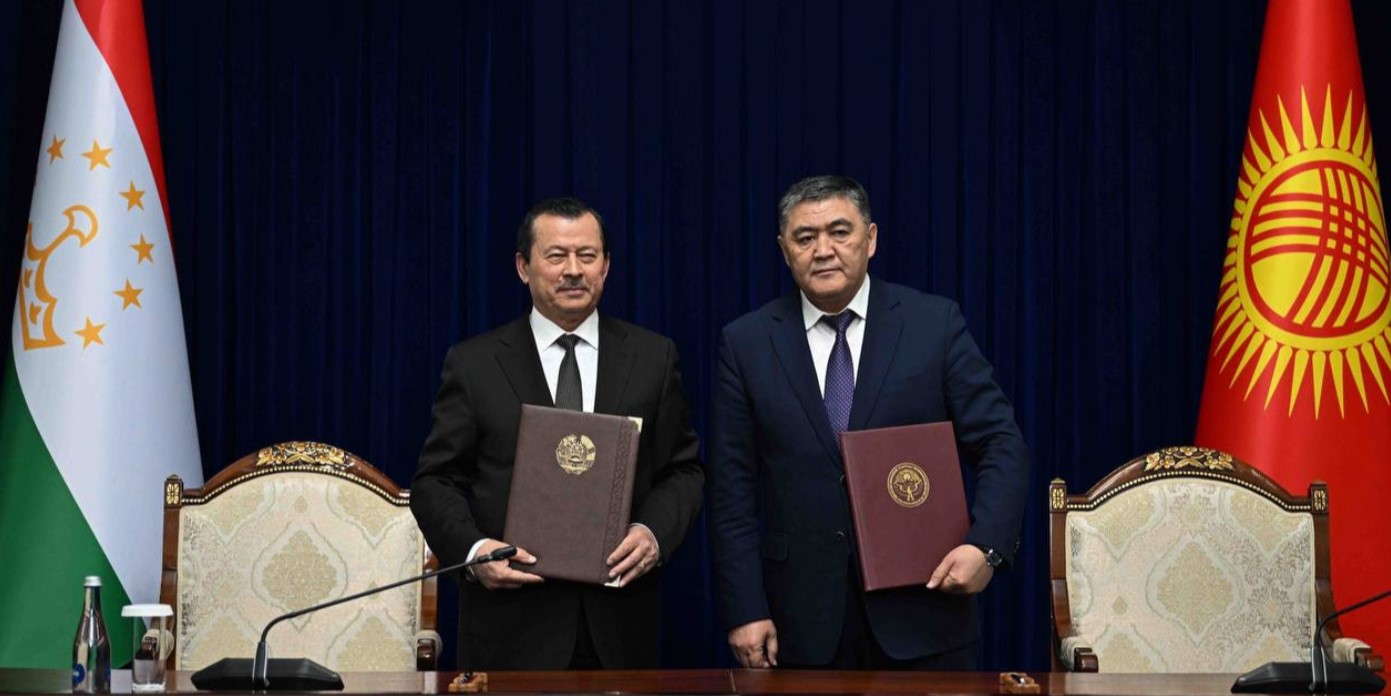
Kyrgyzstan and Tajikistan signed a historic border agreement in Bishkek. Source: Daryo
Trade
Kazakhstan and Iran concluded ten commercial agreements valued at $92.8 million at an Iranian-Kazakhstani business forum in Tehran (Kazinform). Over 50 Kazakhstani and 230 Iranian entrepreneurs attended the forum. Kazakhstan’s Minister of Trade and Integration, Arman Shakkaliyev, and Iran’s Minister of Agriculture, Gholamreza Nouri Ghezeljeh, also participated. Kazakhstan agreed to supply 75 goods worth $250 million to the Iranian market at the forum. In 2024, trade turnover between the two countries surged by 12.3% to $320 million. More specifically, agricultural trade reached $219.8 million, an increase of 33.3%. During the forum, Shakkaliyev met with representatives of several Iranian ministries, agencies, and business organisations. Kazakhstan is specifically interested in expanding agricultural exports to Iran, especially wheat, barley, and vegetables. For instance, he met with the Korafarin Entrepreneurial Council of Iran, representing over 100 major companies. He also spoke at the plenary session of the third Caspian Economic Forum, where he noted the need to strengthen the Trans-Caspian International Transport Route (TITR), apply digital solutions in facilitating trade, and introduce transitional tariffs. Director General of QazTrade, Aitmukhamed Aldazharov, met with Minister Gholamreza Nouri Ghezeljeh to discuss the establishment of an office of the National Institute for Promotion of Goods and Services Exports of Kazakhstan in Tehran. This office would enable Kazakhstani businesses to find new partners and promote their goods in the Iranian market.
According to Kazakhstan’s Bureau of National Statistics, Kazakhstan’s trade turnover amounted to $141.1 billion last year, a rise of 1.3% (Kursiv). Exports rose 3.1% to $81.6 billion, while imports fell by 1% to $59.7 billion. Russia remained Kazakhstan’s largest import partner, with imports from Russia increasing by $1.4 billion over the past year to $18.2 billion. As a result, Kazakhstan’s trade deficit with Russia widened from $6.6 billion to $8.7 billion. Overall, this means that Kazakhstan will continue to remain exposed to price shocks and inflation in Russia.

